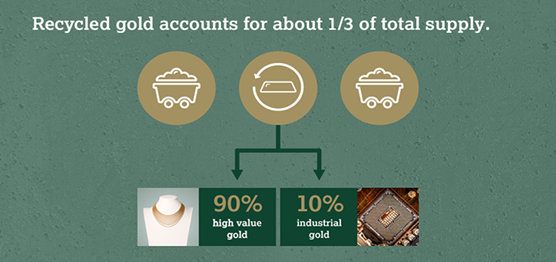

22nd June 2022 (6 Topics)
Context
India has emerged as the fourth largest recycler in the world and the country has recycled 75 tonnes in 2021, according to a World Gold Council (WGC) report.
Key highlights of the report
- Top Rankers:
- China topped the global gold recycling chart as it recycled 168 tonnes
- Italy at the second position with 80 tonnes and,
- The US in the third rank with 78 tonnes in 2021.
- The report was titled as 'Gold refining and recycling’.
- India’s stand in the report:
- India's gold refining capacity increased by 1,500 tonnes (500 per cent) in 2021.
- The gold refining landscape in the country has changed over the last decade, with the number of formal operations increasing from less than five in 2013 to 33 in 2021.
- Due to the government's tightening of pollution regulations, the scale of unorganised refining has fallen.
- Tax advantages have underpinned the growth of India's gold refining industry like the import duty differential.

Significance for India
- India has the potential to emerge as a competitive refining hub if the next phase of bullion market reforms promotes responsible sourcing, exports of bars and consistent supply of the scrap.
- Gold scrap’s share of overall imports has risen from 7 per cent in 2013 to around 22 per cent in 2021 which is a sign of growth to India’s market.
|
The World Gold Council
|
Advantages for India
- Modernisation and changing scenario: Holding periods of jewellery will continue to decline as younger consumers look to change designs more frequently, a trend that could contribute to higher levels of recycling.
- Higher incomes and economic growth: Stronger economic growth will reduce outright selling and consumers will find it easier to pledge their gold rather than sell it outright.
Suggestions for India
- Governmental support: The domestic recycling market is relatively less organised but should gain support from initiatives such as revamped GMS (Gold Monetisation Scheme).
- Role of Currency: The various policy measures sync to make it attractive to bring surplus gold mainstream and liquidity is enhanced via bullion exchanges.
- Organised recycling: It is necessary to support organised recycling with better incentives and tech-based solutions encompassing the gold supply chain end-to-end.
Concerns for India
- Low domestic recycling: India recycles little of its own stock of gold - about 8 per cent of the global scrap supply.
- Economic fluctuations: Recycling is driven by current gold price movements, future price expectations and the economic backdrop.


